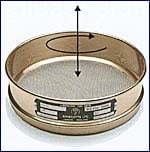
Sieve testing, as I have stated many times, is the Cinderella of particle size analysis because it delivers more value than expected from something that’s so easy to use and relatively inexpensive. However, the problem with standard sieving techniques using wire mesh sieves is that they begin to exhibit accuracy problems in the lower micron sizes.


